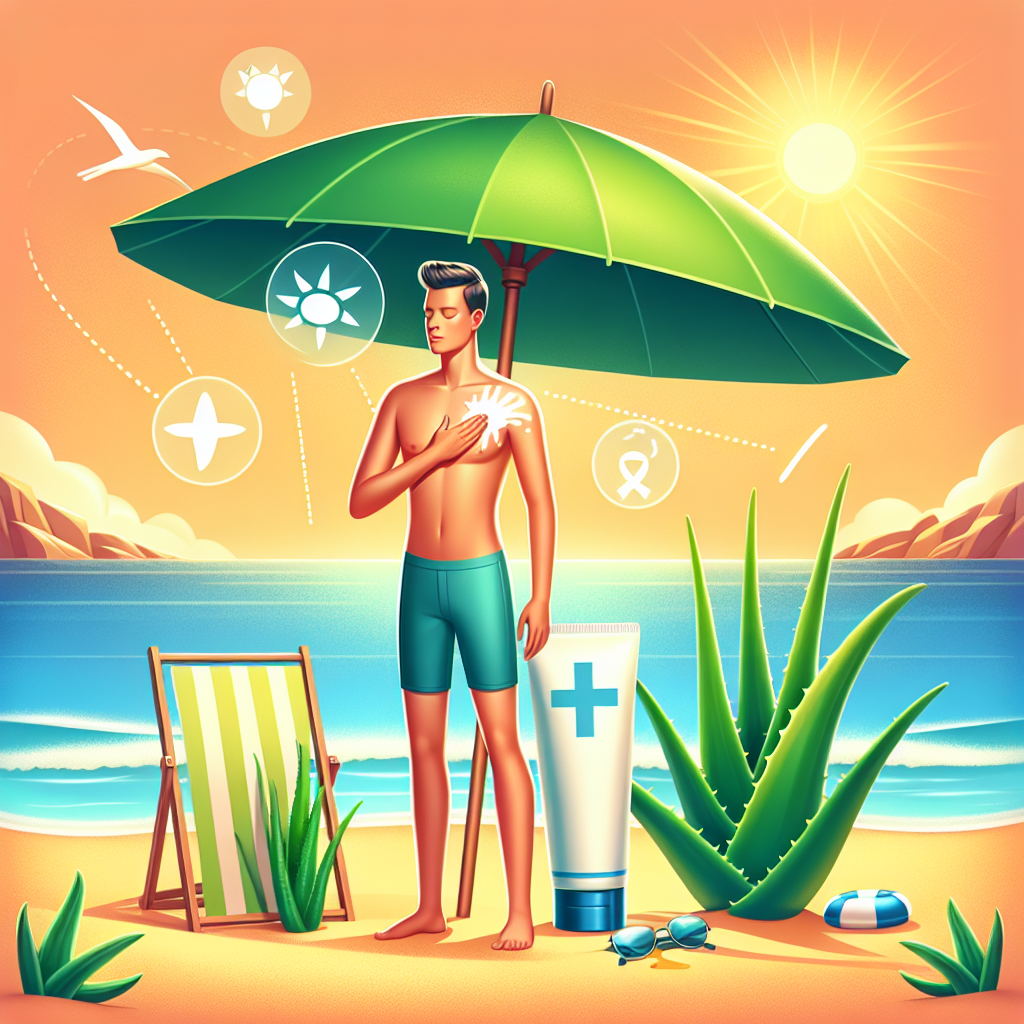Whether you’re planning a day at the beach or simply stepping out to run errands, protecting your skin from the harmful effects of the sun should always be a priority. In this article, discover simple yet effective ways to prevent sunburn, along with tips to soothe and treat your skin in case you do get sunburned. So sit back, relax, and arm yourself with the knowledge to keep your skin healthy and glowing all summer long.

Preventing Sunburn
Importance of Sun Protection
As the sun’s rays become stronger and the temperature rises, it is essential to prioritize sun protection to prevent the painful and potentially damaging effects of sunburn. Sunburn is not only uncomfortable, but it can also increase your risk of developing skin cancer over time. By taking simple yet effective measures, you can greatly reduce the likelihood of sunburn and enjoy the outdoors safely.
Using Sunscreen
One of the most crucial steps in preventing sunburn is incorporating sunscreen into your daily routine. Sunscreen acts as a protective barrier by absorbing or reflecting the sun’s harmful ultraviolet (UV) radiation. With a wide range of sunscreen options available, choosing the right one for your skin type and activity level is vital.
Choosing the Right Sunscreen
When selecting sunscreen, it is important to choose a broad-spectrum sunscreen that protects against both UVA and UVB rays. Look for a sunscreen with a sun protection factor (SPF) of 30 or higher for adequate protection. If you have sensitive skin, opt for a sunscreen labeled as “sensitive” or one that contains physical blockers like zinc oxide or titanium dioxide.
Applying Sunscreen Properly
To ensure maximum effectiveness, it is crucial to apply sunscreen correctly. Start by generously applying sunscreen to all exposed skin, including commonly forgotten areas like the ears, back of the neck, and tops of the feet. Remember to apply sunscreen at least 15 minutes prior to sun exposure to allow for absorption. Reapply every two hours or immediately after swimming or excessive sweating.
Seeking Shade
Seeking shade is another effective strategy to minimize exposure to the sun’s harmful rays. When the sun is at its strongest between 10 a.m. and 4 p.m., finding shelter under an umbrella, tree, or canopy can offer significant protection. This is especially important if you have fair skin or are particularly prone to sunburn.
Wearing Protective Clothing
Clothing can be a powerful line of defense against the sun’s damaging rays. Opt for lightweight and loose-fitting clothing that covers as much of your skin as possible. Dark-colored clothing with a tight weave offers better protection than lighter-colored or loose-weave fabrics. Additionally, consider wearing a wide-brimmed hat to shield your face, neck, and ears from intense sun exposure.
Using Sunglasses
While we often prioritize protecting our skin from the sun, it is equally important to safeguard our eyes. Wearing sunglasses with 100% UV protection shields your eyes from harmful UV rays. Look for sunglasses labeled with UV400 or indicate that they block both UVA and UVB rays.
Avoiding Peak Sun Hours
To minimize your risk of sunburn, it is wise to avoid direct sun exposure during peak hours, typically between 10 a.m. and 4 p.m. During these hours, the sun’s rays are strongest, increasing the likelihood of sunburn and other harmful effects. If possible, plan outdoor activities for early morning or late afternoon when the sun is less intense.
Being Aware of Reflection
It’s important to remember that the sun’s rays can reflect off surfaces such as water, sand, snow, or concrete, intensifying their impact on your skin. This reflection can increase your risk of sunburn even if you are shaded or covered. Be aware of these surfaces and take extra precautions by applying sunscreen more frequently and using additional protective measures.
Staying Hydrated
Proper hydration is vital not only for overall health but also in preventing sunburn. When you spend time outdoors, especially in hot and sunny conditions, you are at a higher risk of dehydration. Drink plenty of water throughout the day to keep your body hydrated and help maintain healthy skin. Carry a water bottle with you and sip regularly to mitigate the effects of prolonged sun exposure.
Treating Sunburn
Recognizing the Symptoms
Despite our best efforts, sunburn can still occur. Identifying the symptoms of sunburn is crucial to implementing appropriate treatment. Common signs of sunburn include redness, pain or tenderness, swelling, blistering, and a sensation of heat on the affected areas. In more severe cases, sunburn can cause dizziness, nausea, fever, and chills. If experiencing these symptoms, it is important to take immediate action to alleviate the discomfort and prevent further damage.
Cooling the Skin
As soon as you notice the symptoms of sunburn, it is essential to cool your skin. Take a cool bath or shower, or apply cold compresses to the affected area. Avoid using ice directly on the skin, as it can potentially worsen the burn. Cooling the skin helps reduce inflammation, soothes the discomfort, and prevents further damage.
Taking Over-the-Counter Pain Relievers
Over-the-counter pain relievers such as ibuprofen or acetaminophen can provide relief from the pain and inflammation associated with sunburn. Follow the recommended dosage and guidelines provided on the packaging, and consult with a healthcare professional if you have any underlying medical conditions or are currently taking medication.
Using Moisturizing Creams
Sunburn often leads to dry, dehydrated skin. Hydrating the affected area with moisturizing creams or lotions can help soothe the skin and promote healing. Look for products that contain ingredients like aloe vera or chamomile, known for their soothing properties. Avoid using petroleum-based or oil-based products, as they may trap heat and exacerbate the burning sensation.
Hydrating the Body
In addition to applying moisturizers topically, it is essential to hydrate your body from within. Sunburn can deplete your body’s moisture, so drink plenty of water or electrolyte-rich beverages to replenish lost fluids. Avoid alcohol and caffeinated beverages, as they can further dehydrate your body.
Applying Aloe Vera Gel
Aloe vera has long been recognized for its healing properties, particularly when it comes to soothing sunburned skin. Apply pure aloe vera gel to the affected area multiple times a day to reduce redness, inflammation, and promote healing. If possible, refrigerate the aloe vera gel for an extra cooling effect.
Avoiding Irritating Products
While treating sunburn, it is essential to avoid using any harsh or irritating products on the affected skin, such as fragrances, perfumes, or exfoliants. These can further irritate the skin and delay the healing process. Stick to gentle, mild products specifically designed for sensitive or sunburned skin.
Taking Cool Baths or Showers
In addition to providing immediate relief, taking cool baths or showers can also aid in healing sunburned skin. Gently pat yourself dry after bathing to avoid further irritation. Avoid using harsh soaps or cleansers, which can strip the skin of its natural oils and exacerbate dryness.
Using Cold Compresses
If you prefer not to take a bath or shower, applying cold compresses to the affected areas can offer similar benefits. Soak a clean cloth in cool water, wring out the excess, and gently place it on the sunburned skin. The cool temperature will provide relief and help alleviate redness and inflammation.
Seeking Medical Attention
Most cases of sunburn can be effectively treated at home with the appropriate care and remedies. However, there are instances where medical attention should be sought. If the burn covers a large area of the body, is accompanied by severe pain, blistering, or shows signs of infection, it is important to consult a healthcare professional. They can provide further guidance, prescribe medication if necessary, and ensure proper healing.
In conclusion, preventing sunburn is crucial for maintaining healthy and protected skin. By prioritizing sun protection, incorporating sunscreen, seeking shade, wearing protective clothing, and staying hydrated, you can significantly reduce your risk of sunburn. However, if sunburn does occur, recognizing the symptoms and implementing appropriate treatment, such as cooling the skin, taking over-the-counter pain relievers, using moisturizing creams, and seeking medical attention if necessary, can help alleviate discomfort and promote healing. Remember, your skin is precious, so take the necessary steps to protect and care for it under the sun.






